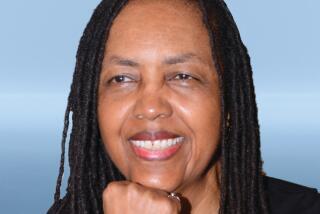No Time for the NAACP to Make a ‘Safe’ Choice
NEW YORK — Given the events of recent months, advocates of racial equality may be forgiven for thinking--to paraphrase Shakespeare--that this is the summer of our discontent. The publicly displayed disarray in the NAACP--the oldest and most respected of the nation’s civil-rights organizations--is the latest in a steady parade of falls from grace by blacks who had become icons of success. Each of these developments receive maximum media exposure, as the depictions of our distress become grist for society’s diversion.
Evidence of personal shortcomings by individual blacks are lumped with assaults by whites on voting rights and affirmative-action programs. Both become blacks’ fault, as well as blacks’ loss. At a time when, despite laws intended to discourage discrimination, racial bias is on the rise in employment, schools, housing and in the criminal-justice system, it would seem to make no sense for blacks to worry about whether or not a black actually committed the latest high-profile crime, or is rightly accused of serious malfeasance in public office. But long experience has taught us that allegations of individual impropriety do “harm the race” by giving renewed vigor to racial stereotypes that just won’t die.
We will likely never know what happened after Benjamin F. Chavis Jr., a civil-rights leader with a long and honorable record, became the executive director of the National Assn. for the Advancement of Colored People. What we do know, though, is that after only 16 months in office, the organization is deep in debt, corporate and foundation contributions have been severely cut or entirely withdrawn and membership is down. Rather than the many worthwhile legal initiatives and social programs carried out by the organization’s national office and local branches, attention is focused on the unsavory aspects of a sexual-harassment claim that Chavis sought to settle with NAACP funds and without notice to either its national board or its general counsel. It does not look good.
Even as Chavis seeks to prolong a painful episode in NAACP history with a court challenge to the fairness of his ouster, I wonder. Suppose Chavis had been a model of personal propriety and fiscal responsibility. Suppose, as well, that Chavis had moved beyond rhetoric and achieved programs of outreach to black gangs and troubled youth, established meaningful coalitions with other black groups across the ideological spectrum--including the Nation of Islam--and mounted a determined search for new directions that more closely connect with the contemporary racial crisis.
How would the NAACP board, funding agencies, the general public and the media respond to him? In other words, how many of us are using Chavis’ failures of judgment and of financial responsibility to hasten from the stage another black man who, for all his failings, was trying to move the NAACP in directions that would distress a substantial portion of the public and more than a few within the organization? We tend to forget that unorthodox thinking and confrontational tactics have been the hallmarks of our best leaders.
My point is not to compare Chavis to Marcus Garvey, Malcolm X or Martin Luther King Jr. Rather, we should not forget that each of these now revered black leaders was castigated during his lifetime, often for perceived personal failings that led many to conclude they were unfit for leadership roles in the black community. Will we welcome and support the next NAACP leader if, despite clear competence, unquestionable commitment and a spotless character, he or she adopts programs aimed at the myriad marks of oppression that afflict so many blacks, particularly poor blacks?
While there is general agreement about the need for more strategies that build self-esteem, teach self-sufficiency and advocate self-help, achieving these goals will almost certainly involve techniques and processes that will be threatening to some whites, particularly those who control funds, grants and the media. In the wake of the Chavis experience, many may urge the selection of a person noted for prudence rather than militancy, charm rather than charisma, skills in conciliation rather than adeptness in confrontation. Indeed, funding sources may insist on such a person as a condition of renewed grants and other financial support. But what may seem a safe pick may be the wrong choice at a time when a growing percentage of the nation’s blacks are in prison and society’s principal response is to build more prisons.
It is all too easy for me and other critics to highlight the inadequacies of current civil-rights approaches to black poverty, family disorganization and crime. It is more difficult to even imagine, much less implement, programs that effectively address these problems. The nation is deeply in debt. Corporate downsizing made possible by technology and fueled by greed has cost millions of Americans their jobs and placed millions more at risk. In today’s tight job market, many employers are unwilling to hire blacks--regardless of their training and experience.
The major response of politicians to this crisis is to ignore it. It is far easier to pander to racial fears and prejudices by defining as “crime” the futile efforts of the dispossessed who are determined to defer their doom by any means possible. Now, as earlier, civil-rights groups and their leaders must understand that from slavery to segregation, this society has never moved to remedy racial injustice until forced by circumstances and persistent black activism.
Subsumed beneath the condemnations of Chavis is the question he too clumsily posed: Who will speak for and define the issues that are relevant to African Americans generally, and, more specifically, into which group of hands will that corporate capital, however meager in the great scheme of things, flow? The black middle classes want to be that conduit, but they have yet to address the issue of whether they are willing to welcome to the policy-making table those to whom the black lower classes listen.
Hope as we might, King will not come back to lead us now. And were he to return with views calling for major economic reform like those he expressed toward the end of his life, he would not long be welcomed. We need to keep a sharp eye and an open mind to ensure that those with King’s potential are not shunted aside because they urge disturbing remedies for conditions that approach the genocidal for some blacks and threaten disaster for us all.
More to Read
Sign up for Essential California
The most important California stories and recommendations in your inbox every morning.
You may occasionally receive promotional content from the Los Angeles Times.










